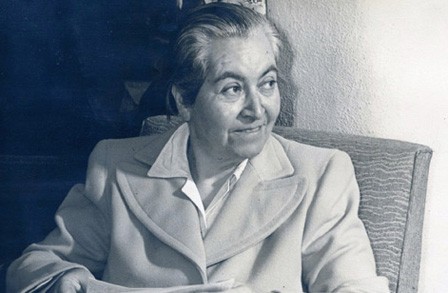Gabriela Mistral (1889-1957), pseudonym of Lucila Godoy Alcayaga, was the first Spanish Amerian woman to win the Nobel Prize for literature (1945). I was impressed by the imagery of her poem La extranjera, that I read here in an English translation by Helene Masslo Anderson:
The Stranger
She speaks in her way of her savage seas
With unknown algae and unknown sands;
She prays to a formless, weightless God,
Aged, as if dying.
In our garden now so strange,
She has planted cactus and alien grass.
The desert zephyr fills her with its breath
And she has loved with a fierce, white passion
She never speaks of, for if she were to tell
It would be like the face of unknown stars.
Among us she may live for eighty years,
Yet always as if newly come,
Speaking a tongue that plants and whines
Only by tiny creatures understood.
And she will die here in our midst
One night of utmost suffering,
With only her fate as a pillow,
And death, silent and strange.
We are introduced to some strange woman from the blockbuster Pirates of the Caribbean. Savage seas (mares bárbaros) with things unknown. She is praying to her god who is formless and weightless (isn’t Christianity the refusal to accept that their god, too, is formless and weightless?) ‘envejecida como si muriera’. Her strangeness is contagious and has affected our garden, where the woman has planted cactus and alien grass (zarpadas hierbas).
The desert wind fills her and somehow we know she has loved with white passion, but she doesn’t care to speak of it because we will not understand her. The face of unknown stars, stars that don’t even have a number, stars we merely imagine. And so she speaks, only understood by the tiny creatures (to whom the environment is the same because their plant habitat has been transplanted by the woman?)
Her death is not soft. Utmost suffering. Her fate is a ‘pillow’ she can lay her head on. Does that mean consolation? And is the silence and strangeness of death also strangely comforting?
In Spanish it ends like this: “con sólo su destino por almohada, / de una muerte callada y extranjera“. So she dies of a death ‘extranjera’ (I would translate ‘foreign’). We never die completely astranged, the idea of our ‘destino’ will keep us company.
This poem was written for Francis de Miomandre, a French novelist and translator.

One thought on “Reading: The Stranger by Gabriela Mistral”
Comments are closed.